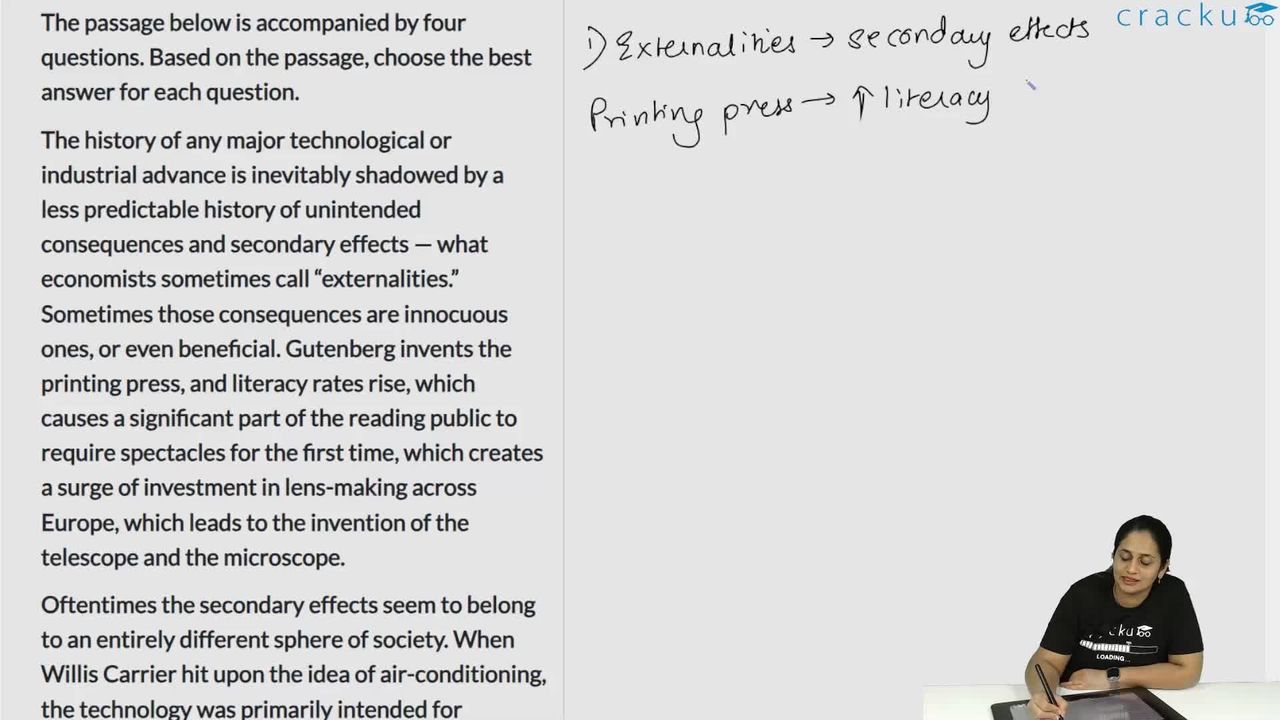Sign in
Please select an account to continue using cracku.in
↓ →
The passage below is accompanied by four questions. Based on the passage, choose the best answer for each question.
The history of any major technological or industrial advance is inevitably shadowed by a less predictable history of unintended consequences and secondary effects — what economists sometimes call “externalities.” Sometimes those consequences are innocuous ones, or even beneficial. Gutenberg invents the printing press, and literacy rates rise, which causes a significant part of the reading public to require spectacles for the first time, which creates a surge of investment in lens-making across Europe, which leads to the invention of the telescope and the microscope.
Oftentimes the secondary effects seem to belong to an entirely different sphere of society. When Willis Carrier hit upon the idea of air-conditioning, the technology was primarily intended for industrial use: ensuring cool, dry air for factories that required low-humidity environments. But…it touched off one of the largest migrations in the history of the United States, enabling the rise of metropolitan areas like Phoenix and Las Vegas that barely existed when Carrier first started tinkering with the idea in the early 1900s.
Sometimes the unintended consequence comes about when consumers use an invention in a surprising way. Edison famously thought his phonograph, which he sometimes called “the talking machine,” would primarily be used to take dictation….But then later innovators… discovered a much larger audience willing to pay for musical recordings made on descendants of Edison’s original invention. In other cases, the original innovation comes into the world disguised as a plaything…the way the animatronic dolls of the mid-1700s inspired Jacquard to invent the first “programmable” loom and Charles Babbage to invent the first machine that fit the modern definition of a computer, setting the stage for the revolution in programmable technology that would transform the 21st century in countless ways.
We live under the gathering storm of modern history’s most momentous unintended consequence….carbon-based climate change. Imagine the vast sweep of inventors whose ideas started the Industrial Revolution, all the entrepreneurs and scientists and hobbyists who had a hand in bringing it about. Line up a thousand of them and ask them all what they had been hoping to do with their work. Not one would say that their intent had been to deposit enough carbon in the atmosphere to create a greenhouse effect that trapped heat at the surface of the planet. And yet here we are.
Ethyl (leaded fuel) and Freon belonged to the same general class of secondary effect: innovations whose unintended consequences stem from some kind of waste by-product that they emit. But the potential health threats of Ethyl (unleaded fuel) were visible in the 1920s, unlike, say, the long-term effects of atmospheric carbon build up in the early days of the Industrial Revolution….
Indeed, it is reasonable to see CFCs (chlorofluorocarbons) as a forerunner of the kind of threat we will most likely face in the coming decades, as it becomes increasingly possible for individuals or small groups to create new scientific advances — through chemistry or biotechnology or materials science — setting off unintended consequences that reverberate on a global scale.
The author lists all of the following examples as “externalities” of major technical advances EXCEPT:
Option B is the correct answer.
This is not an externality because it was the original intended use of air-conditioning. The passage mentions that Carrier invented air-conditioning to ensure cool, dry air for factories with low-humidity requirements.
The other options are externalities:
Option A: This is an unintended consequence. CFCs were initially used in refrigeration and air-conditioning, but their long-term environmental impact (ozone depletion) was not anticipated.
Option C: The Jacquard loom was originally a mechanical device for weaving patterns in fabric, but it led to the development of programmable machines, which had far-reaching effects on modern computing, which was also an unintended consequence of the loom's invention.
Option D: The passage states that the phonograph was initially designed for dictation but was adapted for music recording, which was an unintended consequence.

Click on the Email ☝️ to Watch the Video Solution
Create a FREE account and get:
Educational materials for CAT preparation